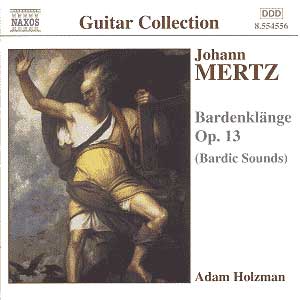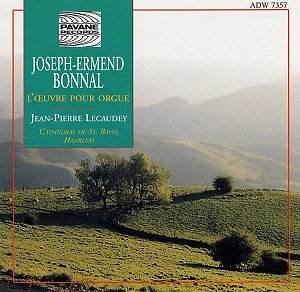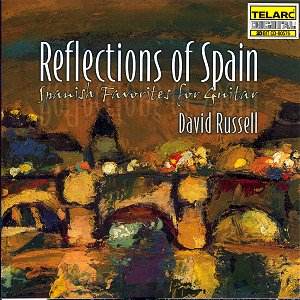 Composer: Johann Kaspar Mertz
Composer: Johann Kaspar Mertz
Works: Bardenklänge, Op. 13; Unruhe; Lied ohne Worte; Fingals Hohle; Abendlied; Etude; Romanze: Andante; Elfenreigen; An Malvina; Capriccio; Gondoliera; Variations mignonnes; Sehnsucht; Kindermärchen; Gebeth; Liebeslied; Scherzo; Romanze: Moderato; An die Enfernte; Tarantelle
Performers: Adam Holzman – Guitar
Recording: 2001?
Label: NAXOS 8.554556 [62:41]
Johann Kaspar Mertz, a figure of the mid-19th century, is often relegated to the sidelines of the guitar repertoire, overshadowed by the burgeoning piano compositions of his time. His works, notably the Bardenklänge, Op. 13, reflect a period where the guitar, once a prominent solo instrument, struggled to maintain its status amidst the rising dominance of the piano. Mertz’s compositions exhibit a pianistic quality, heavily influenced by the Romantic ethos, yet they also reveal a longing to reclaim the unique voice of the guitar. This dichotomy is central to understanding his music and the challenges he faced as a composer dedicated to the instrument.
Adam Holzman’s interpretation of Mertz’s Bardenklänge is commendable, especially given the work’s complexity and its historical context. The selection of nineteen out of the thirty movements showcases Mertz’s ability to weave together various genres, from lyrical pieces to virtuosic studies. Holzman’s technical prowess shines through as he navigates the intricate passages with fluidity and grace. For instance, in “Elfenreigen,” the interplay of melody and accompaniment is executed with a delicate touch, allowing the ethereal quality of the piece to resonate. However, one might argue that Holzman occasionally leans too heavily into a pianistic approach, which can at times obscure the guitar’s distinct timbral qualities.
The recording itself stands out for its clarity and balance, a hallmark of NAXOS’s engineering standards. Each note is captured with precision, allowing the listener to appreciate the subtleties of Holzman’s performance. Yet, there remains a certain emotional distance that pervades the recording. In movements such as “Romanze: Andante,” while Holzman’s phrasing is technically proficient, the interpretation lacks the depth of expression that one might hope for in music deeply rooted in Romantic sentiment. This is particularly evident when compared to James Reid’s rendition, which, despite its own shortcomings, offers a more compelling emotional arc.
Mertz’s oeuvre, particularly in the context of the mid-19th century, serves as a fascinating study of an artist striving to elevate the guitar through compositional complexity often at the expense of its inherent character. Holzman’s recording is an admirable tribute to Mertz’s legacy. However, while it showcases the technical demands of the repertoire, it occasionally falls short in conveying the profound emotional depth that the music inherently possesses. The listener is left with a sense of admiration for both the performer and the composer, yet yearning for a deeper connection to the expressive core of the works.



